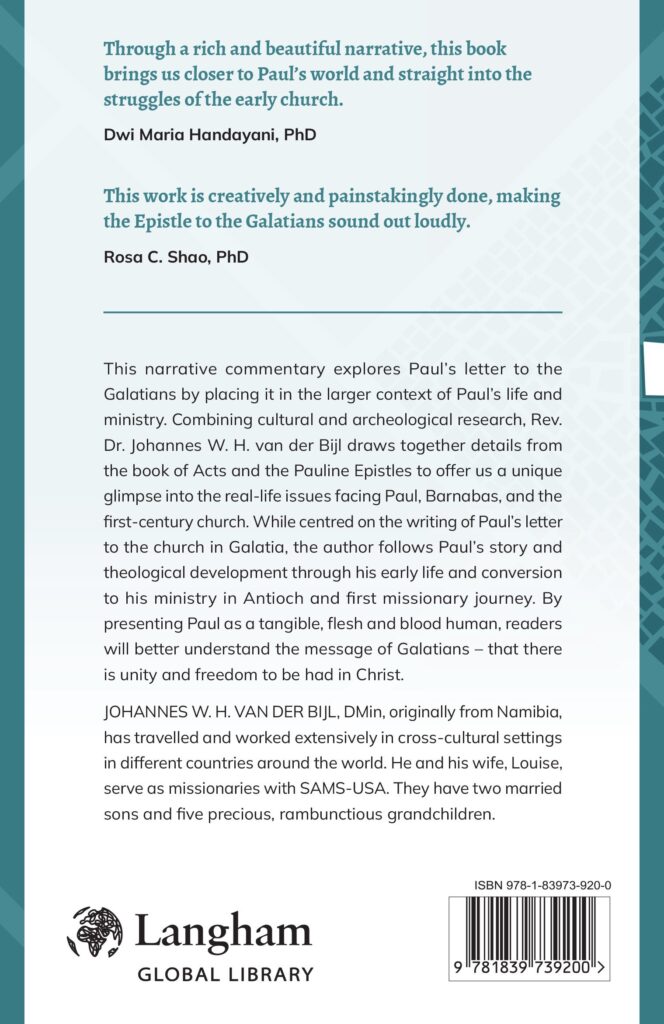
SAMS at Provincial Assembly
If you are attending the ACNA Provincial Assembly at St. Vincent’s College (June 25-28), come see us and visit with SAMS Missionaries and Staff and hear more about our work among the Global Anglican Church


The honorary degree recipients at Dartmouth’s June 9 Commencement will be, clockwise from top left, Roger Federer, the Commencement speaker; Mira Murati, Thayer ’12; Paul Nakasone; Richard Ranger ’74; Roy Vagelos; Mung Chiang; Joy Buolamwini; Liz Cheney; and, center, John Urschel.
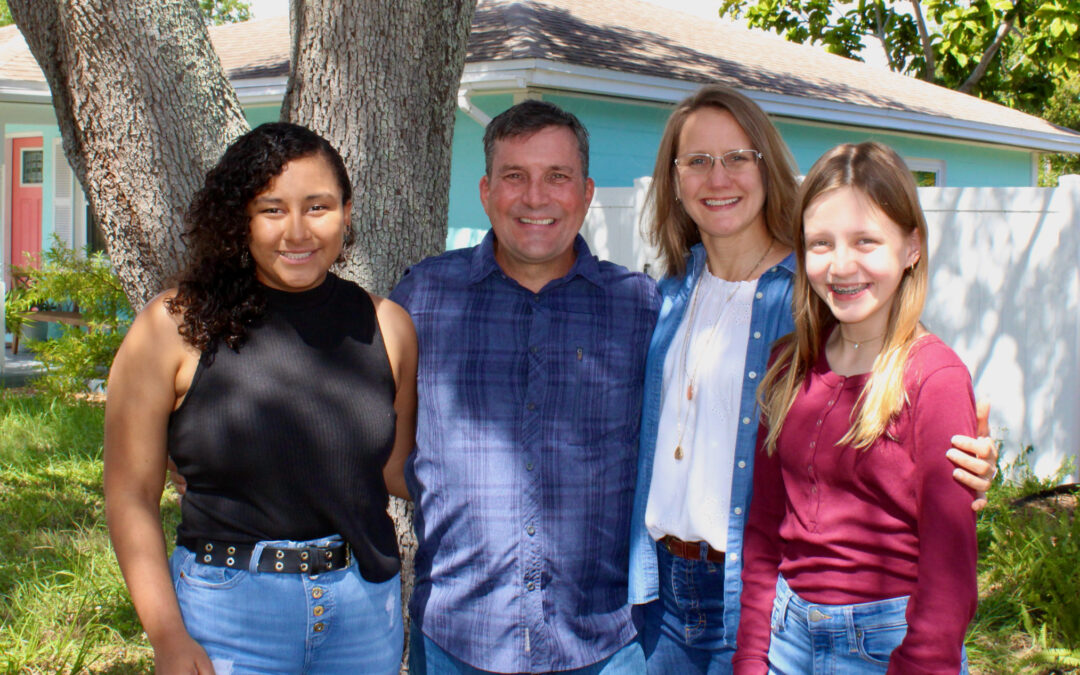
Raising children in the mission field can present some challenges to missionary parents and their children. Many missionaries are not always fully aware that other missionaries and SAMS as a sending Society desires to walk alongside families with pastoral sensitivity, a listening ear, and loving support.
SAMS Missionaries, Kim Miller and her husband Mike, encountered some of these challenges with their children upon their return from Honduras. Kim felt called to develop a TCK Care Program. Her aim is to raise awareness of Third Culture Kids issues and give SAMS families much-needed resources and care.
She recognizes many of the strengths of missionary kids such as a lifelong interest in learning about new cultures and the ability to quickly acquire social skills. Open-mindedness and interpersonal styles based on respect and empathy are typical of third culture children, as is autonomy and the disposition to help others. However, children of missionaries also experience things that are unique to their lives within a cross-cultural context that require care that is appropriate and focused on them.
Kim has partnered with industry-leader TCK Training to bring about a new program for SAMS designed to minister to SAMS families with children. The program has three main components which include Family Care, TCK Direct Care, and Child Safeguarding.
The Family Care portion of TCK Care involves family check-ins designed to proactively reach out to SAMS families to ask questions about how they are doing in a non-intrusive way. The goal is for families to be loved and supported and for parents to be ministered to when it comes to their children.
Kim can also help families with a support plan if parents are seeing a lack of resiliency in their children and even assist to help prevent crises from occurring through preventative care. Part of family care also includes life-change updates which may occur, for example, with births in the family, or family deaths, or larger life events like major upcoming moves. Families find that caring support through these life events makes a real difference. A TCK newsletter produced by Kim will also be made available to families.
The second component is directed care to the children called TCK Direct Care. This care is age-appropriate from age 4 and up. Research has shown that many missionary children experience mental health issues as adults from unresolved problems that occurred during childhood. Kim can provide a safe space for kids to express some of the difficult things they experience living cross-culturally and process their emotions.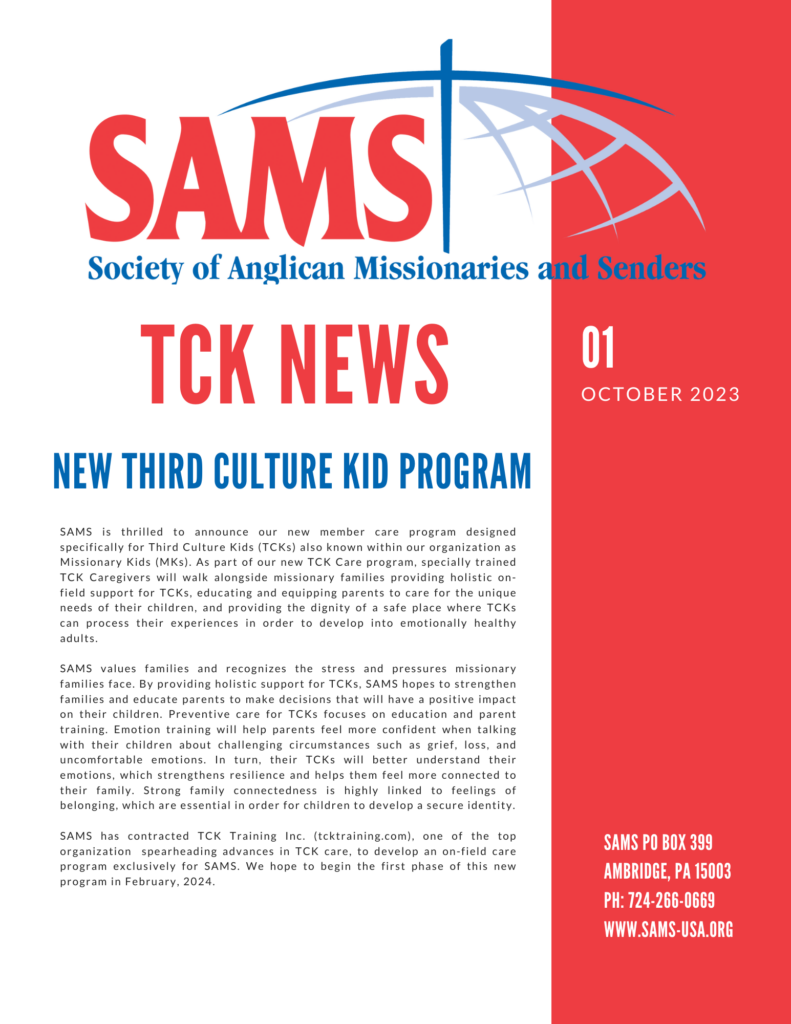
The last component of TCK Care is Child Safeguarding. This component defines guidelines for SAMs staff and personnel in the event of a child safety issue. The guidelines cover anyone going to visit missionaries and their children, and personnel interacting with missionary kids. The guidelines contextualize the unique needs of TCK children with sensitivity to their lives. The guidelines are also for parents in helping identify things that parents can look for and communicate to TCK caregivers.
In tandem with these care initiatives, an overriding concern for missionary parents is education of their kids. The ability to connect parents with the right educational resources is crucial. This is already being done by parents and for some it is straightforward, but for some the burden of educating their children and navigating their needs is not, particularly in a cross-cultural setting. The TCK Care Program can help support families educationally.
TCK education directed to parents empowers and trains parents to learn some of the preventive steps that can be used with their kids by encouraging them to learn the language of emotion and encouraging their children to express themselves and talk about hard things in healthy ways. The idea is to teach parents to train their children to talk about both good things as well as difficult things as a way to process grief and loss in healthy ways.
One last emphasis for TCK Care is to help SAMS Missisonary kids feel more connected to SAMS as an organization. Kim Miller is working with SAMS personnel to make this happen. Sometimes the parents have a stronger sense of SAMS, but the children are a step further removed. Kim plans to roll out some very intentional ways for SAMS kids to develop community among one another as well as at some of the larger SAMS events.
Kim encourages parents with questions to reach out to her with questions.
Kim Miller
SAMS Children’s Ministry, Missionary
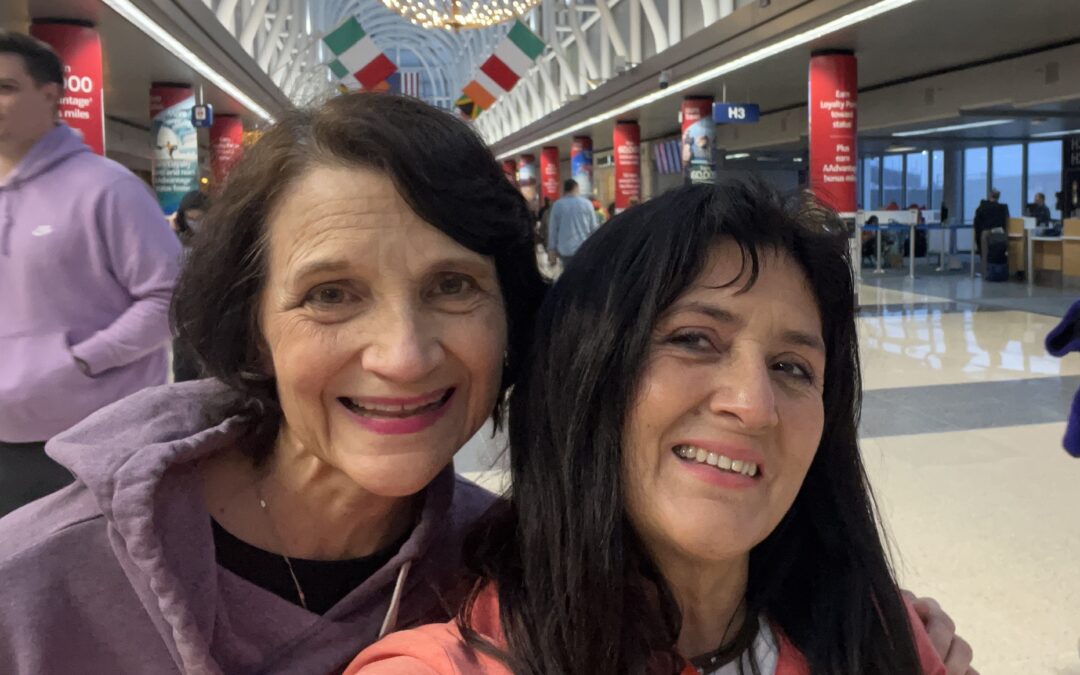
by Heidi Smith, SAMS Missionary to Chile
Twenty-nine years ago, I met a young woman named Carla at the beginning of the new school term. Carla happened to be our son Joshua’s new kindergarten teacher. We were living in Villa Alemana, Chile, where my husband Russ was serving as pastor of San Esteban, the Anglican parish there. I would often see Carla at school and it wasn’t long before I discovered that she was a ‘disillusioned Mormon.’
As Carla related some of her story to me it was clear she was struggling. She had left the Mormonism of her childhood because of the inconsistencies she had witnessed – people saying one thing but doing another. She clung to the idea that if you could be perfect, or at least look perfect, you would be ok. Appearances were everything to her.
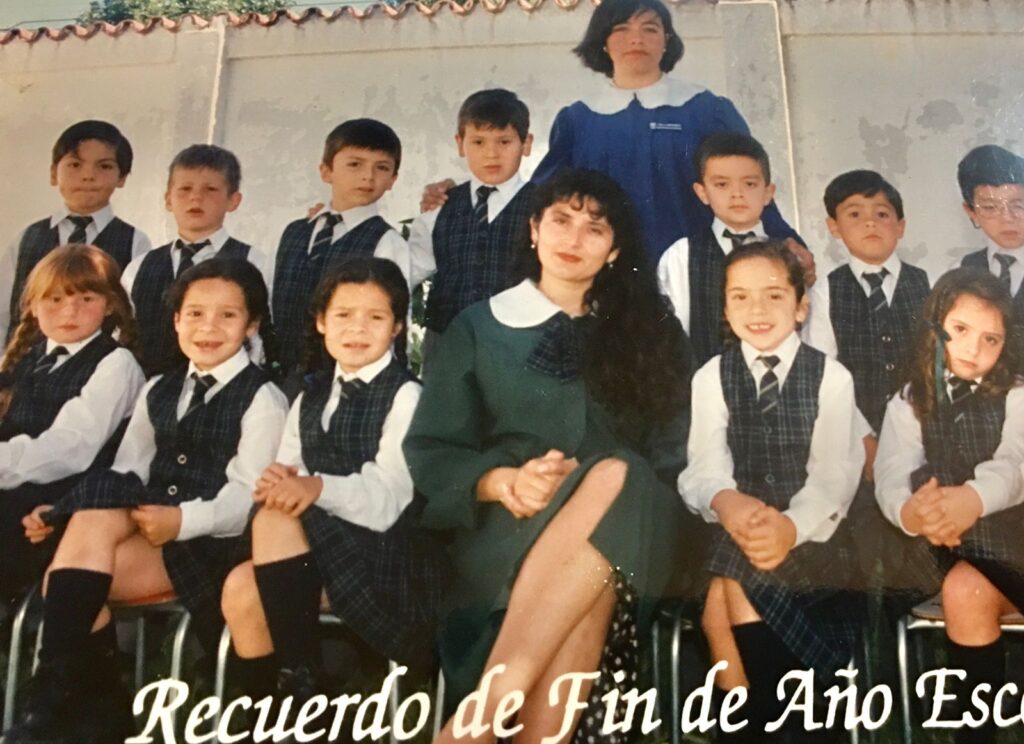
Carla with Kindergarten Class in Villa Alemana
One day I invited her to our ladies’ group and she seemed to really enjoy it, especially when we talked about God, about answer to prayer, and about the difference Jesus could make in your life. Later on, Carla had told me that our ladies’ group had reminded her of her Pentecostal grandmother whose robust faith she had seen firsthand when living with her during college. Her grandmother had impressed upon her how real her faith was to her. Her grandmother had never stopped praying that one day God would bring Carla out of Mormonism and bring her to Christ.
Soon afterward Carla asked to meet with me to talk one-on-one. When we met, I had the chance to share the Gospel with her. “But,” Carla objected, “God can’t accept me because I am not perfect.” “None of us is,” I told her, and she insisted that I was. I explained to her that that was definitely not the case!
I told her, “The only perfect one is Jesus, and He died to take the punishment we deserve for our sins. His death makes it possible for us to be forgiven and to come into a relationship with God through Him…. would you like to receive Jesus into your life?” She said, “Yes, I would.” As she began to pray, she acknowledged her sin and asked Jesus to come into her life. She told Him that she renounced anything she had been taught in the Mormon church that did not agree with God’s truth. That was the beginning for Carla.
She started coming to church and doing Bible study and growing in her faith. The church family received her with open arms as a single mom. A few years later, God blessed Carla with a husband, a Christian musician named Pablo who loved her and her little son, married her, and received 3-year old Andres as his son. Soon after, little Daniela came along.
A few years later, we moved from Villa Alemana to a city 500 miles to the south. Carla, Pablo, and their kids moved 1000 miles to the north when Pablo found work in the mining industry. Carla was able to find an even better teaching position there. Now we were separated by 1500 miles, and other than seeing each other’s news on Facebook, we didn’t have much contact for more than a decade.
Ironically, it was the COVID pandemic that brought us together again. Chile was very locked down. Gatherings of any kind were prohibited including church services for over a year and a half. Zoom meetings became the way to connect, and we reached out to people we had known over the years who we thought might be interested in joining us for an online prayer, worship and, study.
Carla joined the nightly women’s prayer meetings and once again we were involved in each other’s lives. It was an amazing time, but not without difficulties. Carla went through what she later described as “a huge storm in my life.” She told me that she would not have made it had it not been for the support of our nightly prayer group. By God’s grace she did persevere, and a new chapter in her life had begun.
As the pandemic ended the Prayer Group began meeting weekly. The relationships forged during those months were too strong to just let go. Last October, at one of our weekly prayer times, I announced to the group that Russ and I would be traveling to the U.S. for our bi-annual time of visiting supporting churches.
Out of the blue, Carla piped up, “I want to go with you.” “Right,” I replied jokingly, “Just hop in my suitcase and you can come.” But Carla wasn’t joking. She not only wanted to come, she believed that God wanted her to come. As the days went by, I realized she was serious. I spoke to Russ about it because in all of our 37 years in Chile, we had never had someone from Chile join us on our home assignment. To my amazement, Russ thought it was an interesting idea.
I told Carla that our home assignment was not a vacation and there wouldn’t be much time for tourism. She had never even left Chile, much less visited the U.S. I asked her why she wanted to come. She said, “I want to go with you to visit the churches that support you. I want to see what you do.” I asked if she would be willing to share her story to which she responded with an enthusiastic “YES!”
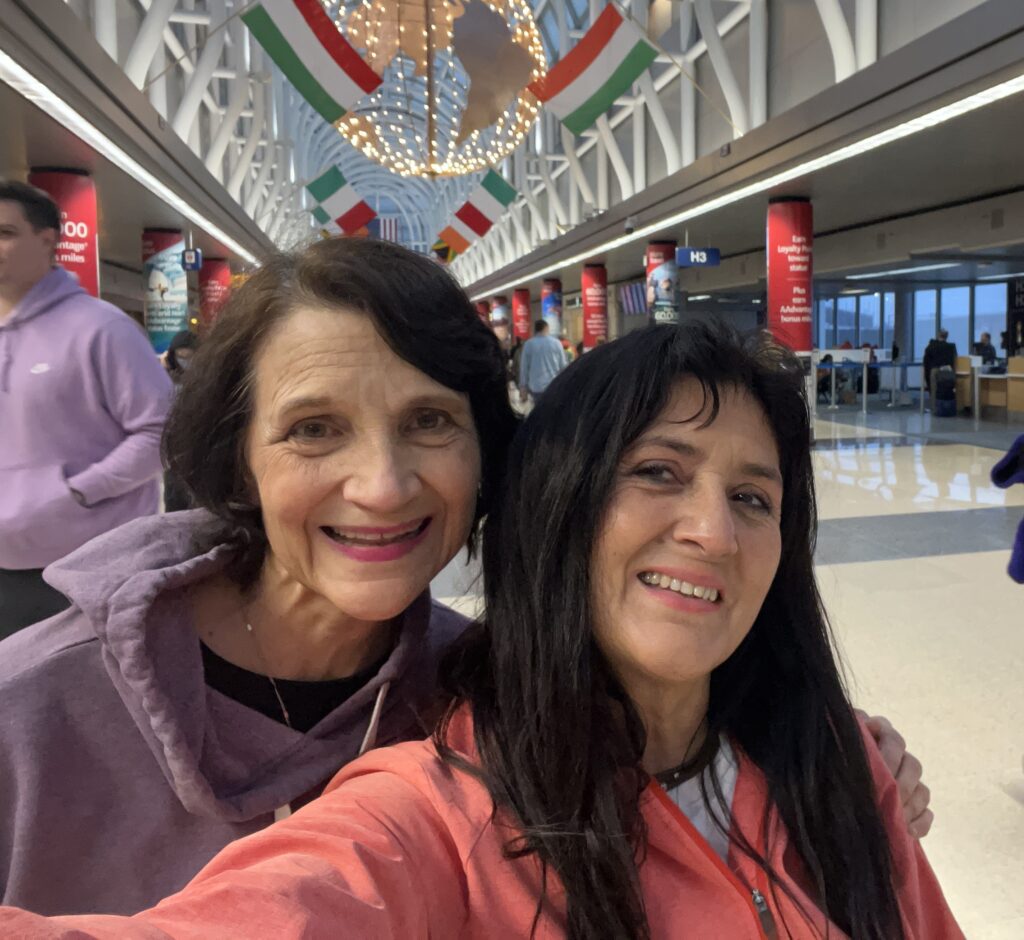
Heidi and Carla at O’Hare Airport
Everything came together, as it does when God is in it, and on a record-breaking frigid night of -22 degrees in Chicago, Carla arrived at O’Hare airport. Twelve hours later, she was by our side, sharing her story in the church we were visiting that morning. She got choked up as she read it. (She had it written down to be sure she got the English right.) I put my arm around her and got teary too. And then I noticed that people in the congregation were tearing up. Afterwards, people came up to her and told her how her story had touched them.
Besides talking about how she had met us 29 years ago, Carla included the following in the story she shared with 10 groups of people over the next 17 days she was with us:

Carla with Heidi and Russ sharing her testimony to the congregation
It seems there were words of truth and encouragement in her story for many people to hear. God brought her with us as the “good fruit” of our ministry in Chile all of these years, as well as to be an ambassador for Him. It’s a testimony of how He can bring light out of darkness. And about when we go through “a great storm,” God does not abandon us. Our Way Maker is making a way for us to encounter Him and others. “Even when we can’t see it, He’s working. Even when we can’t feel it, He’s working,” and as the words of that song say. “He never stops, never stops working.”
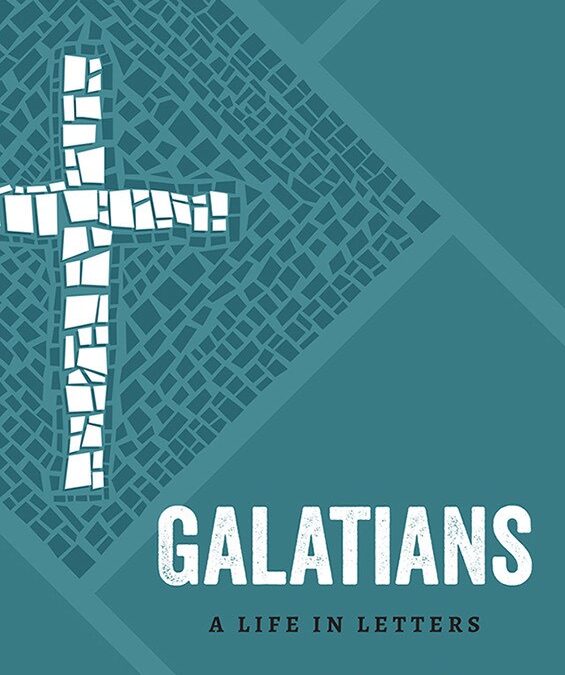
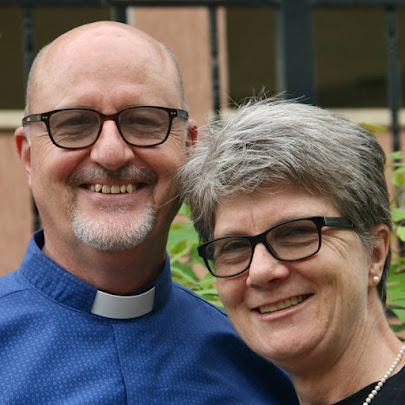 Johannes Vanderbijl is an ordained Anglican priest and SAMS Missionary serving along with his wife, Louise, in the Netherlands, at Christ Church, Heiloo. He has been earnestly writing over the last four years about the life of Simon Peter with two published books to date that have been well received: Breakfast on the Beach (Langham Publishing: 2021) and For the Life of the World (Langham Publishing: 2022). Both books focus on Peter’s ministry of making disciples using Jesus’ four-fold method of discipleship. The books are written chronologically, and Johann situates these early disciples’ lives in the real world, the day-to-day, nitty-gritty of their lived experience.
Johannes Vanderbijl is an ordained Anglican priest and SAMS Missionary serving along with his wife, Louise, in the Netherlands, at Christ Church, Heiloo. He has been earnestly writing over the last four years about the life of Simon Peter with two published books to date that have been well received: Breakfast on the Beach (Langham Publishing: 2021) and For the Life of the World (Langham Publishing: 2022). Both books focus on Peter’s ministry of making disciples using Jesus’ four-fold method of discipleship. The books are written chronologically, and Johann situates these early disciples’ lives in the real world, the day-to-day, nitty-gritty of their lived experience.
What follows is an interview with Johann Vanderbijl about his most recent book, a narrative commentary of Galatians, and how it and his other books relate to discipleship.
Johann, thank you for taking the time to discuss your upcoming book. You are focusing your first in a series of commentaries on the Apostle Paul and his Letter to the Galatians, but you have written it in a narrative style. Why did you choose to start with Galatians, and why a narrative style?
After writing in a narrative style about Simon Peter in my first two books, Langham asked if I would consider writing about Paul in the same manner. I’ll be honest – I’ve struggled with Paul all my life. I saw Paul as the John Wayne of the New Testament: a tough guy who never does anything wrong, a ‘cowboys-don’t-cry’ kind of person, whereas Peter was far more relatable to me—more expressive and emotional—hence why I felt I could write about Peter.
So, I thought, how am I going to approach this with Paul? As I was contemplating and praying, I had the idea: why not tell Paul’s story using his letters chronologically? Thus, I draw from what we are told about Paul in Acts and elsewhere, using anything that could describe Paul at that moment. I incorporate elements from his other epistles and utilize his own language as I compose these books. This volume is the first in a series of commentaries, and Galatians was his initial letter; hence, I chose to start with Galatians.
One aspect of my approach is to portray Paul’s childhood, drawing partly from speculation based on some of his previous statements—that he hailed from a family of Pharisees, came from Tarsus, and was taught by Gamaliel, etc. I piece these details together in a conversational form. Sometimes, for example, he converses with Barnabas, while at other times, I incorporate the leaders of the church in Antioch because they were sent out by the Church there. Therefore, the leaders respond to the news they received from the Galatians about the Jewish Christians who had gone there, demanding that they become Jews before becoming Christians. All of this is presented in a conversational style.
What were some of your key takeaways of Galatians?
I am currently writing on First and Second Thessalonians, which have more of a typical Greek style and structure, whereas Galatians feels like an explosion. It reads like a massive rant; Paul hardly greets them before exclaiming, ‘You foolish Galatians, who has bewitched you?!’ You can sense the emotion, making it a tough book to start with.
I also found that some parts of Galatians don’t flow smoothly because Paul jumps around in his writing. Consequently, I felt the need to fill in some gaps by explaining what he was saying, especially when there was an Old Testament background. In those instances, I would have another character say, “In other words, you are saying…” This approach mirrors other commentaries where a narrator would clarify statements. Since this is a narrative commentary, another character addresses Paul’s statements, shaping how I write it.
As I mentioned before, I always saw Paul as a kind of John Wayne, a super-masculine character. However, I’ve changed my perspective. While I still see him as masculine, of course, I now perceive a lot more emotion from him, especially as I read his other letters. He weeps over those who do not believe, he struggles and longs for Timothy and the Thessalonians. So, my opinion of him has evolved; I now see a much more tender side to this man. The anger he exhibits in Galatians stems from genuine concern for them. It’s essential to remember that Paul was an ancient Middle Eastern man who expressed emotions like rejoicing, and I try to reflect that cultural context appropriately in certain points of the letter.
A narrative style seems very accessible to everyday Christians. Did you have them in mind when you wrote this commentary?
The interesting thing is that when I began writing this, I had oral learners in mind. I thought of places like Gambela (before the Netherlands, Johann and Louise served in Gambela, Ethiopia, where Johann was Dean and Principal at St. Frumentius Anglican Theological College), and other remote areas in Africa. However, it turns out that young Americans have been deeply moved by my narrative books. Some even suggest that Americans are increasingly becoming oral learners, and there seems to be evidence for that.
Here in the Netherlands, people are also reading it because they enjoy stories – they read novels. Whether they believe it is another matter; they may not read the Bible at all, but they will read a story about Peter’s or Paul’s life and ministry.
Another audience I had in mind was those who would never travel to the Middle East. I think of Christians in South Sudan or Ethiopia who, despite their desire to better understand the Bible, are unlikely to travel to Israel, let alone Greece or Rome. Therefore, I wanted to depict Galatians in story form, with as much detail as possible. There are many aspects in the Gospels and the epistles that are specific to certain geographical locations and are taken for granted by Christian authors, making it difficult for someone sitting in Africa to fully grasp. That’s why I endeavor to paint a vivid picture of a particular setting or describe everyday elements like what they might have been drinking, the aroma of cooking, or the light from the burning oil lamp.
You’ve said before that one of your overarching aims in your writing is to help the church to be better disciple-makers. Why does that seem to be such a challenge now, do you think?
Part of the issue is that we’re accustomed to certain methods that no longer yield the same results. We rely too heavily on outdated approaches. The way people engage with truth has evolved. For example, street evangelism in the Netherlands isn’t effective anymore. Here, it’s more of a gradual process. You spend time with friends, discussing mundane topics like the weather or pets. Then, eventually, someone might inquire about your occupation, and that’s when the door opens slightly.
However, you don’t rush in; you proceed cautiously, gradually introducing discussions about faith through storytelling. Why? Because everyone can connect with stories, and it’s less intimidating. I share personal narratives interwoven with Jesus to create opportunities for deeper conversations. It’s about establishing rapport and slowly dismantling barriers. That’s essentially what I aim to achieve in my books and now with the Galatians commentary. They are approachable, readable, and as readers engage with them, they encounter truth in narrative form.
Another factor is the lack of familiarity with Scripture, which is why I write my books – to reconnect people with the Bible through storytelling. However, I believe the issue runs deeper. Many individuals decide to follow Jesus without truly grasping the implications. When we evangelize, our primary focus is often on winning souls, neglecting to convey the profound transformation that following Jesus entails. Jesus frequently emphasized the cost of discipleship to prospective followers. Starting the journey of discipleship on the wrong footing can make the entire journey much more challenging.
It is evident, Johann, that there is a common motivation between your writing and the time you spend with others, wouldn’t you say?
Whether it’s the preparation you invest in writing or spending time with others, it’s all part of a journey. Jesus spent at least three years walking with his disciples before the crucifixion, prompting us to ask: are we truly willing to invest in a small group of individuals until they can replicate our efforts? That’s the essence I glean from the Gospels. Jesus invested time in his disciples, gradually preparing them to carry on his work. It took three years before he felt confident leaving them, instructing them to teach others to do the same.
Paul exemplifies this approach as well. He traveled with disciples like Timothy and Silas, walking alongside them on their journey. Nowadays, however, it often feels more like a microwave process: quick and superficial. We focus on conversions, then pass new believers on to pastors, saying, “They’re your responsibility now.”
In my parish, I’m endeavoring to shift this mindset. I’m teaching parishioners that each of them is a disciple-maker, capable of ministering without constant reliance on the pastor. This aligns with Paul’s emphasis on pastors equipping members to do the work of ministry. The hierarchical model of a professional priesthood has, in many cases, hindered disciple-making. Ordinary Christians are God’s vessels for connecting with diverse individuals. Each person’s journey is unique, requiring tailored approaches to sharing the gospel.
I don’t consider myself special because of seminary training. Anyone can engage in disciple-making if they’re willing to learn how to share their story and the story of Jesus. Therefore, we prioritize training our members in storytelling. In my preaching, teaching, and writing, I strive to present the truth of the gospel through storytelling, encouraging people to walk with Jesus.
Johann, thank you for taking the time to sit down and talk.
Galatians: A Life in Letters by Johannes W.H. van der Bijl, Langham Publishing. Available online through multiple sellers at the end of March.
Johannes and Louise van der Bijl Missionary profile
